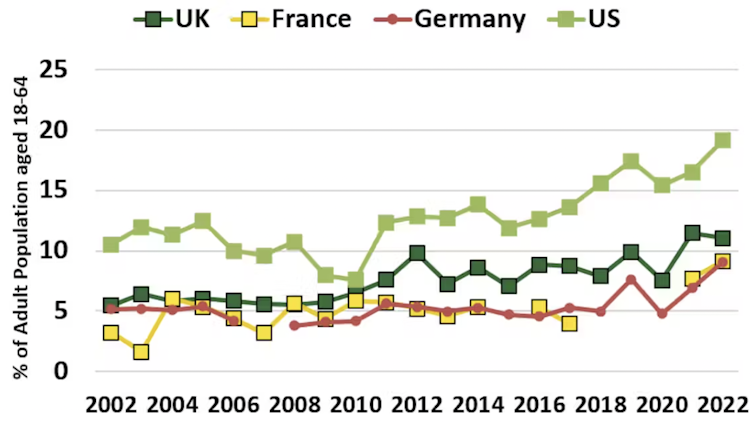The Johnson/Truss debacle of 2022 made people more afraid of starting businesses – new findings
- Written by Mark Hart, Professor of Small Business and Entrepreneurship, Aston University

The UK picked a bad year to have a political crisis in 2022. The markets were already jittery because the global economy was struggling to recover from COVID. The war in Ukraine drove up energy costs, leading to high inflation and a cost of living crisis in many developed economies. In the UK, these pressures had combined with the effects of Brexit to sharply raise[1] the cost of doing business.
Then, in early July, Boris Johnson was forced to resign[2] as prime minister, ushering Liz Truss into office. Her administration’s inaugural budget in September led to an economic shock as markets gave their judgement overnight. On the back of this, business confidence collapsed[3].
This was the backdrop to our annual Global Entrepreneurship Monitor 2022[4] (Gem) survey. We surveyed just over 10,000 people in the UK between June and late September (3,000 phone interviews and 7,000 web surveys). We found the UK was in the midst of an uncertain summer that made people less inclined to start businesses. The nation has duly lost ground in the entrepreneurial stakes to rival economies, though there are a few positives buried in the data as well.
The Johnson/Truss effect
By the time we had finished our first 2,000 phone interviews by late June 2022, 12.9% of respondents[5] were in the early stages of starting businesses. Once we had concluded our fieldwork in September, the rate of entrepreneurship among all 10,000 respondents was 11%, suggesting it declined over the summer.
If we just compare the phone interview statistics to factor out any potential variations in how people answer the two types of survey, it’s even more compelling. The final 1,000 phone interviewees in the weeks after Johnson had resigned showed an entrepreneurship rate of just 7.4%. This is hardly surprising as the relentlessly negative headlines about the state of politics and the economy filtered through to people’s economic choices.
This self-inflicted wound by the party of government also means the country’s entrepreneurship trend diverged from the US, France and Germany. Those countries have all seen sharp increases in early-stage entrepreneurial activity following the pandemic. The UK experience paints a depressing picture of how easy it is to shake the confidence of potential entrepreneurs.
Adults setting up businesses by country, 2002-22 (%)







